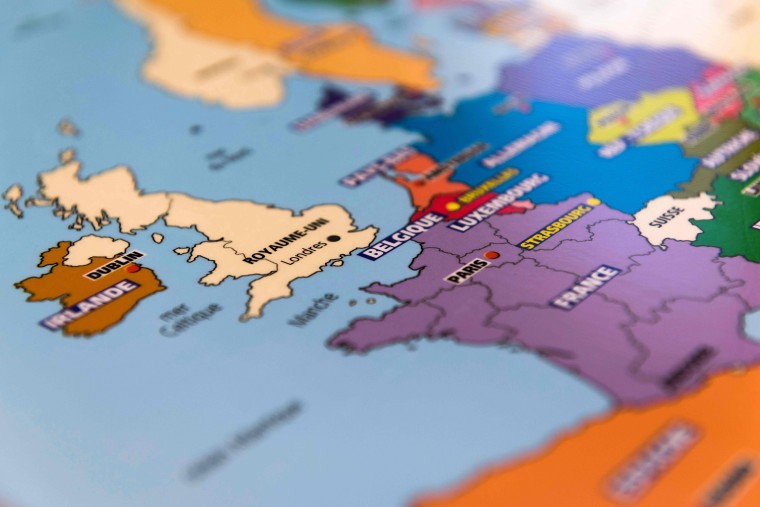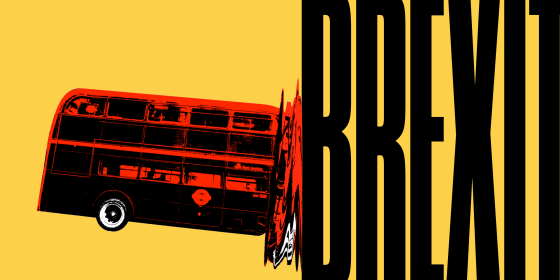LONDON — Friday was meant to be the day Britain's Brexit mayhem finally reached a moment of certainty.
Instead, Prime Minister Theresa May suffered her third major defeat on plans to leave the European Union, with lawmakers rejecting it in a 344-286 vote.
Though smaller than the previous two losses — which were the largest and fourth largest in parliamentary history — the vote spells continued uncertainty and turmoil for Britain and Europe.
The prime minister, who even offered to resign in exchange for lawmakers' support, pleaded in vain with the House of Commons before the vote.
"It's the right thing for our country, it's the right thing for our constituents, and with all my heart I commend this motion to the house," she said. After her latest failure was confirmed, she told lawmakers the result should be "a matter of profound regret to every member of this House."
The result means the new Brexit deadline is April 12. However, moments after the vote, European Council President Donald Tusk announced he had called a summit on April 10.
This could mean the E.U. is prepared to give another extension, raising the possibility that the U.K. will participate in European elections. Anti-Brexit campaigners hope this might increase the chances of a less-extreme departure from the E.U., a second referendum or even no Brexit at all.
After the vote, the leader of the opposition Labour Party, Jeremy Corbyn, urged her to resign and call an election.
"This deal has to change, there has to be an alternative found," he said. "If the prime minister can't accept that then she must go."
Next week, lawmakers will put forward their own plans for what Brexit should look like. None of these achieved a majority when they were first submitted to Parliament on Wednesday, although some came close.
Unless there is some sort of intervention either way, Britain will crash out of Europe without a deal — something many consider a nightmare scenario.
And while London disagrees and dithers, the mood in Europe is bleak.
The view from E.U. officials has been "one of absolute astonishment and exasperation that the British body politic cannot decide what it wants to do," Michael Emerson, a former ambassador in the European Commission, said Friday.
From its headquarters in Brussels, the E.U. announced this week that it believes it is "increasingly likely" the U.K. will fail to reach any deal at all.
"They don't trust the U.K. political class not to screw up," Charles Grant, director of the Centre for European Reform, a London think tank, tweeted Thursday.
Some pro-Brexit Britons worried May's deal would tie the U.K. too closely to Europe. Others are simply angry at the delay in Britain's final departure.
While lawmakers were voting, this feeling was evident on the streets of London where thousands of so-called Brexiteers marched amid a heavy police presence, waving British flags and chanting, "Out means out!"
'Ridiculously harmful'
Another tactic May tried was narrowing the vote to only the main part of her deal: the withdrawal agreement, which sets out the terms for the U.K.'s immediate divorce from the E.U.
This was partly an attempt to win support of lawmakers in the opposition Labour Party, but the handful who flipped did not offset the ongoing rebellion in her own Conservative Party.
All of this means that a "no-deal Brexit" is still on the table. This outcome does have its supporters, but most experts predict it would be a hammer blow to the British economy, and even threaten to destabilize some of the basic aspects of day-to-day life.
Before the U.K. voted to leave in June 2016, it was bound to the E.U. by more than four decades of shared laws and regulations. The relationship has become so close that Britain and the other 27 member states operate almost like a single country in many respects.
Crashing out without a deal would see these myriad agreements torn up overnight.
Some of the predictions are terrifying: shortages of food, medicine and basic supplies such as toilet paper; suggestions that farmers might be forced to slaughter and burn 10 million lambs because they can no longer sell them to Europe; and miles of traffic jams as haulage trucks encounter their first port checks in years.
The military has put 3,500 troops on standby and already has a crisis team operating out of a subterranean nuclear bunker below the Ministry of Defense.
Perhaps more alarmingly, a no-deal Brexit could mean some form of what is known as a "hard border" between Northern Ireland, which is part of the U.K., and the Irish Republic, which is a separate country and will remain in the E.U. after Brexit.
At the moment the border is all but invisible. Many fear a physical boundary would become a target for sectarian agitators, risking a return to violence rarely seen since The Troubles, a 30-year conflict that plagued the U.K. until 1998.
Hard-line Brexit supporters have argued that under this scenario the U.K. would be within its rights not to pay its divorce bill of around 39 billion pounds (around $51 billion). Legal experts say the E.U. could respond by simply suing the U.K. in an international court.
In all, the British economy could be 9 percent weaker over 15 years under no-deal than if it had stayed in the E.U., according to the government's own estimates.
The damaging ripples would likely not stop there.

No-deal could have dire implications for the economy of the Irish Republic, whose second-largest export market is the U.K. In France, Belgium and the Netherlands, it would mean devoting large amounts of money, resources and personnel to check all goods coming from Britain.
"A no-deal Brexit would be suicidal stupidity," said Emerson, the former European Commission ambassador who is now an associate senior research fellow at the Centre for European Policy Studies, a think tank in Brussels. "It would be harmful for the E.U. but ridiculously harmful for the U.K."
So much damage, psychologically at least, has already been done.
Brexit has paralyzed large aspects of public and private life, carving unprecedented rifts within the major political parties, saturating news media, and sparking bitter arguments between family and friends the country over.
Many analysts feel that a general election — reshuffling the U.K.'s knife-edge parliamentary arithmetic — is now a real possibility in the coming months.
Accompanying the dismay emanating from Europe, there has also been a deep sense of frustration at what they see as Britain's chronic indecision.
"It's still not entirely clear what the U.K. wants," said Larissa Brunner, a policy analyst at the European Policy Centre, another Brussels think tank. "The E.U. has been asking the U.K. this question for the past two and half years. There are enough other crises in the world that Europe should be focusing on instead."

